Twenty-two horses slaughtered for food at UK abattoirs since the end of January – one in 50 of the total – have tested positive for the veterinary painkiller phenylbutazone – commonly known as bute, the Food Standards Agency(FSA) has revealed.
In all, 1,042 horses have been tested since the new regime of 100% testing was introduced. The government says the bute presents a very low risk to human health. Most of the positive tests have been found since mid-February, when ministers said no carcasses could leave abattoirs until tests had proved they are clear of the drug.
The figures were released to the Guardian after it emerged that supermarket Asda was recalling a range of budget corned beef because "very low levels of bute" had been found in a product that had previously had traces of horsemeat.
The latest developments in the contamination scandal are likely to fuel concerns that the crisis is not over, even though the corned beef is the only product so far to have tested positive for bute having previously been found to contain more than 1% equine contamination. Twenty-four products have so far been named in industry tests.
Sales of frozen burgers and ready meals continued to slump last month. Frozen burger sales slid 32% in the four weeks to March 17, compared with the same period a year before, according to Kantar Worldpanel. That's a slight improvement from the 43% slump recorded in February. Frozen ready meals continued to drop by 12% in March, the same pace as February.
The extra precautions on releasing carcasses after slaughter were introduced after David Heath, the food and agriculture minister, revealed that six out of eight carcasses tested in the first weeks of the scheme had tested positive and six may have entered food in France. He called the presence of bute "unacceptable" and said anyone found to have broken the law would be dealt with.
The Department for Environment, Food and Rural Affairs said on Tuesday: "Horse owners are legally responsible for keeping a passport that records the veterinary medicines it has received. Obtaining and using a fraudulent passport is an offence and could lead to a fine of up to £5,000."
Mary Creagh, the shadow environment secretary, said tougher rules must be imposed on the food industry.
"A lot of these products are long-life or frozen so the stick around in people's cupboards and freezers for up to a year. Every product found to be contaminated with horsemeat from the beginning of the scandal should be recalled and we should be absolutely clear about what those products are."
Creagh said the FSA should have publicised a central list of affected products that could be easily accessed by worried shoppers. "Some supermarkets have been clear about it and some have not."
Richard Lloyd, the executive director of Which?, said the continuing scandal exposed the need for urgent changes to the way food fraud was detected and standards enforced.
"These serious failings must be put right if consumers are to feel fully confident in the food they are buying once more.
"Ministers must ensure that everyone involved, including their own departments, the FSA, the food industry and local authorities, are crystal clear about their responsibility to protect consumers and are properly equipped to do so."
Tesco's and Asda's websites name all the products they have tested and those which have failed but several rivals are much more coy about the number of items that have been withdrawn from sale or even found to contain horsemeat.
Discount chain Aldi's website, for example, gives a high profile to information about its use of British meat but fails to mention that two of its frozen ready meals were found to contain horsemeat. The Co-operative's website, gives prominence to a piece boasting that "our latest tests on all our own-brand minced beef products have been confirmed as containing beef and only beef".
The fact that it found horsemeat in some of its own-label frozen burgers, however, is hidden away at the bottom of a press release entitled: "Meat testing – a few words of reassurance."



Comments (…)
Sign in or create your Guardian account to join the discussion